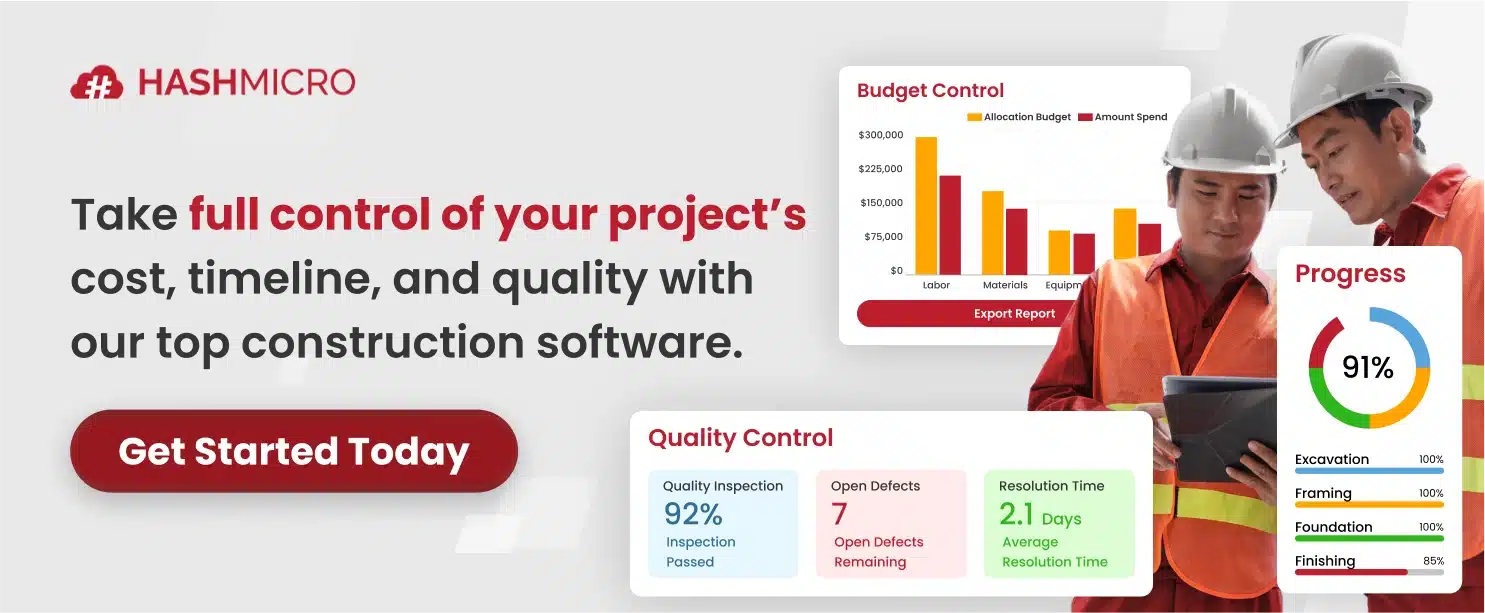When you think about tools that keep your construction projects on time and under budget, which matters more: real-time resource visibility or automated reporting? Choosing the right system can help you manage both without juggling spreadsheets and disconnected apps.
In construction, an ERP system integrates finance, procurement, scheduling, HR, and project performance into a single platform. Research from Dodge Construction Network found that among general contractors who already use ERP, 88% report overall satisfaction, and 73% say it improves real-time project performance tracking.
Every construction project has unique scopes, shifting priorities, and fragmented stakeholders. That’s why a tailored ERP standardizes workflows, reduces rework, and improves office-to-site coordination, showing the need for ERP software in construction businesses.
Key Takeaways
|
What is the Construction Industry?
The construction industry comprises various activities related to the development, improvement, and maintenance of physical structures such as buildings, roads, bridges, and other infrastructure.
Activities in the construction industry include planning, design, procurement of materials and equipment, construction, and maintenance and renovation of existing structures.
I see the construction industry plays a crucial role in a country’s economic growth by providing large employment opportunities and improving the quality of existing infrastructure.
Types of the Construction Industry
There are several types of construction industries; here are some lists I have selected for you:
- Residential: an industry related to the construction of houses and apartments.
- Commercial: an industry related to the construction of commercial buildings such as office buildings, shopping centers, hotels, and others.
- Industrial: an industry related to the construction of factories, warehouses, and other industrial facilities.
- Infrastructure: an industry related to the construction of public infrastructure such as roads, bridges, railways, and airports.
Key Features of the Construction System
Construction ERP software integrates multiple essential functions into a unified system, helping construction companies streamline operations from end to end. Below are the key features that distinguish construction-specific ERP solutions from standard ones.
1. Cost-Value Reconciliation (CVR) and financial management
Cost-value reconciliation (CVR) involves comparing estimated project costs with actual expenses to identify variances and make timely adjustments. Traditionally, a time-consuming process, it becomes far more efficient when automated through ERP software.
With integrated CVR reporting, construction companies can reduce manual effort, eliminate calculation errors, and gain accurate financial insights for better decision-making.
2. Procurement
ERP software simplifies procurement workflows by automating everything from requisitions to purchase orders. This reduces paperwork, minimizes human error, and speeds up approval cycles.
Real-time inventory tracking provides complete visibility of stock levels, preventing overstocking or shortages. Integration with financial modules ensures transparency of costs throughout the entire process, supporting stronger project budgeting.
3. Document and drawing management
Construction ERP centralizes document and drawing management, allowing teams to store, access, and collaborate on files in one place. Remote access supports real-time collaboration, while built-in audit trails track all edits and updates for complete transparency.
Additionally, the integration between ERP modules lets users easily link 2D or 3D models across project workflows, maintaining consistency and accuracy.
4. Materials and equipment management
With real-time visibility of materials and equipment, construction ERP helps businesses optimize usage, reduce waste, and prevent costly project delays. Demand forecasting tools enable proactive planning to ensure the right materials are available when needed.
5. Labour management and payroll
Managing diverse teams and subcontractors is a significant challenge in construction. ERP software simplifies this by providing a centralized system for tracking labor allocation, attendance, and productivity.
It automates payroll calculations, including wages, overtime, and deductions, ensuring accuracy, compliance, and significant time savings for HR teams. Supervisors can monitor workforce performance in real time, enabling better scheduling.
6. Supply chain management
A construction ERP system enhances supply chain efficiency by providing real-time visibility, accurate demand forecasting, and optimized inventory management. Automated workflows streamline purchasing, approvals, and order processing, ensuring compliance and reducing lead times.
Most importantly, it fosters better communication among all stakeholders, such as suppliers, contractors, and managers, through a single integrated platform that keeps everyone aligned.
Why did Project Monitoring and Evaluation Need to Implement a Construction ERP System?
Monitoring and evaluation are two important stages that determine the success of a construction project in terms of TOR advantages. Both have different meanings and purposes. Monitoring is the routine process of checking project progress and identifying bottlenecks.
Evaluation is a sporadic activity used to draw conclusions about the project’s relevance and effectiveness. Running these two important activities is very risky and time-consuming if you still do them manually.
The most complete construction ERP system can improve efficiency in construction project management, inventory, customer management, and employee management. That way, this system can help you monitor and evaluate all aspects of ongoing construction.
The benefits of implementing an ERP system for development projects include improved work efficiency and more effective inventory management. In addition, you can manage construction business prospects and employees effectively.
Regulatory Compliance for Singapore Construction Projects
Construction projects in Singapore operate within a comprehensive regulatory framework designed to ensure safety, quality, and environmental sustainability. Understanding these requirements is essential for contractors, developers, and project managers who want to avoid costly delays and penalties.
- Building Control Act and permit requirements
Before any structural work starts, developers must secure structural plan approval and the permit to carry out structural works, then apply for TOP or CSC at completion through the CORENET e-Submission system. Since 2025, submissions move through CORENET X and require BIM files in IFC-SG format, so project teams need strong digital readiness. - Workplace Safety and Health (WSH) regulations
WSH rules require strict controls for high-risk activities, including Permit-to-Work processes, risk assessments, and oversight by qualified WSH Officers. MOM enforces compliance through inspections, and breaches can result in stop-work orders, major fines, or imprisonment, as well as mandatory safety training for workers and supervisors. - Contractors Registration System (CRS) requirements
From June 2025, firms hiring foreign workers on S Pass or Work Permit must register under BCA’s CRS for both public and private projects. Registration typically involves meeting financial and track-record thresholds, and the CRS grade influences public-sector tender eligibility and limits. - Green Mark and environmental compliance
Certain new builds and major retrofits must meet Green Mark requirements, including minimum certification thresholds based on project size and scope. With stricter Green Mark targets and initiatives like GMI and the MEI regime, sustainability reporting, energy audits, and improvement plans are becoming core project deliverables.
How Integrated Systems Transform Construction Operations
As the construction industry faces increasing demands for efficiency and precision, understanding the benefits of ERP software becomes crucial for companies aiming to stay competitive and manage their projects more effectively.
1. Optimizing Planning
Improper planning within a construction company can lead to substandard project completion and even the company’s downfall. Hence, contractors can incur heavy losses, including labor costs and loss of clientele, due to the untimely completion of targets.
Moreover, the delay in project delivery due to poor planning reflects poorly on the company’s goodwill. Planning for required raw materials, effective use of labor, architectural design, and schedules is critical to the proper channeling of resources.
In addition, an ERP system for a construction company can be implemented to help control expenses and manage budget allocations. So it helps avoid unnecessary downtime and contractual issues with clients throughout the project.
The best ERP software for construction can also guide you on how to improve construction performance. ERP software can calculate the percentage of progress contractors make from their performance.
In addition, an ERP system for construction companies can manage employee salaries, including bonuses, overtime, and base pay. That is why the construction industry today is in dire need of ERP software.
2. Streamlining Project Management within the Construction Industry
Distributing assignments and monitoring project progress across several work locations has always been challenging in the construction business. Meanwhile, with the help of an ERP system, construction industry managers can easily monitor the status of various activities.
It can track the status of each project, create milestones, delegate assignments to the right staff, and perform other activities. Real-time data enables contractors to track the time each staff member spends on each task. Furthermore, the ability also makes it easier for them to bill clients. With the right CRM system, you are able to boost your sales team’s productivity.
Monitoring sales and purchases of construction goods is sometimes often neglected and not noticed by construction industry managers. This can make the company’s finances large so that production costs become out of control. That is why Singapore construction software is here to solve this problem.
Construction ERP software can help contractors manage construction projects effectively and efficiently. An ERP system for a construction company is one of the software that many businesses in Singapore use. This is because they see ERP software as a mandatory system for improving company performance.
3. Facilitating Cost & Revenue Estimation

Most construction industry companies work on a contractual basis with their clients. Before acquiring the tender for a project, they are required to bid on the project with their estimated costs.
Different clients have different priorities. The most suitable bid chosen is based on the design proposed, the reputation of the company, and most importantly; the estimated costs proposed.
From my experiences, ERP for construction companies enables you to determine the accurate estimation required for raw materials, designs, labor, and the duration to carry out a project. So that the actual costs will not deviate much from the projected costs.
Therefore the construction ERP features also allows you to know about the amount of revenue and loss of profit from each project. So they will be able to manage the time and costs used for future projects more wisely.
4. Simplifying the Exchange of Information
Larger construction industry companies handle more than one client at a time. That way, it makes the exchange of information within the company tedious and confusing.
Managing and compiling data for many tasks in the form of Excel spreadsheets or PowerPoint presentations are very inefficient and impractical, not to mention this is also not a safe way.
ERP software makes data exchange easier through resources and firewalls that support optimal data security. Contractors can also provide restrictions on their data; which can be shared with the client or can be seen by the employees.
The Singapore construction ERP system is a system that can maintain company data more effectively and efficiently. In addition, using ERP Singapore software can also make it easier for you to analyze what percentage of project performance. This can help construction industry managers in determining the best decisions to improve company performance.
5. Improving the Decision-Making Process

A centralized system helps improve efficiency by providing a comprehensive view of a particular situation before making decisions. Whenever staff is required to correlate information from different sources, the ERP for construction software assists in extracting data.
It can also provide relevant criteria that must be adjusted before fulfilling a request. For instance, before making a purchase order for certain raw materials, the budget report has been submitted to the project manager. It’s based on what they call the engineering team and the formulated construction-industry design.
Besides that based on this design, the purchasing manager creates the purchase order. This situation must then be screened by the accounting department before getting approved. You could get help from accounting software for this as well.
6. ERP System for Construction Company Enables You to Increase ROI
Contractors naturally want to increase their ROI over time. ROI can be measured in terms of money and other benefits, and ERP software for a construction company can help achieve it.
The large number of projects in the construction industry means they need investors to fund them. However, before an agreement is reached with investors, contractors will see the value and benefits of recruiting investors as financiers.
This is what makes ERP software mandatory for companies. Construction ERP is a mandatory system in the construction industry. This is because ERP software can easily calculate what percentage of ROI they will get after recruiting investors.
This will certainly make it easier for companies to assess and determine what price to offer investors. That is why today, construction ERP applications are mandatory applications for the construction industry.
7. Construction Projects with Different Locations
A construction site is known as an area where a construction project is carried out. Project location also covers all types of work, such as road construction, sewerage, and other infrastructure projects.
If you have a company engaged in the construction sector, it is likely that building operations are spread across different areas. In addition, it is very likely that your project is far from your main company.
The existence of construction projects in different locations certainly presents big challenges that you have to face. The main challenge you will encounter is the process of monitoring and evaluating each project in remote locations.
This, of course, will take a lot of time and energy if you visit different and far-apart project sites. Moreover, manually preparing monitoring and evaluation reports will increase the workload.
Therefore, you need the right solution to overcome these problems. The best way to simplify the monitoring and evaluation of construction projects is to use high-quality construction software.
How ERP Software Helps Construction Business In Singapore
For established contractors like Lum Chang Building Contractors, ERP software plays a central role in managing daily operations across multiple projects, teams, and compliance requirements. Below is how construction ERP is typically used in day-to-day operations within a large, multi-project contractor model.
- Project cost control and budgeting
Tracks budget, committed costs, variations, and actuals in real time so PMs can protect margins across multiple projects. - Procurement and subcontractor management
Runs PR to PO workflows, manages subcontractor claims, and aligns purchasing with the site schedule and approved budgets. - Workforce deployment and site productivity tracking
Plans manpower across sites, tracks attendance and overtime, and links labor data to daily site output for tighter control. - Progress billing and cash flow visibility
Automates progress claims, retention, and invoicing so finance can forecast cash flow and reduce billing delays. - Compliance and documentation management
Centralizes permits, safety records, method statements, and audit trails to make BCA/MOM or client audits faster and cleaner.
Conclusion
An ERP system for construction companies in Singapore allows them to eliminate manual, time-consuming, and labor-intensive processes. It helps control expenditures for raw materials and employees, reduces IT costs, eliminates unnecessary downtime, and ensures project deadlines are met.
Need help finding an ERP that truly fits your construction workflows in Singapore? Share your operational challenges with our expert to get a recommendation that aligns with your processes, reporting needs, and rollout timeline.

FAQ About Construction Industry
-
What are the 4 types of construction?
The four primary categories of construction include residential, commercial, industrial, and infrastructure construction.What is CAD construction software?
CAD, or computer-aided design and drafting (CADD), is a technology developed to enable creators to design, draft, and produce technical documentation digitally, effectively replacing traditional hand-drawn methods with a digital-first approach.What is Cloud ERP do in the Construction?
Cloud ERP helps construction companies manage business processes in a single platform, saving time and costs by automating tasks. Compared to ideal for construction projects.






























